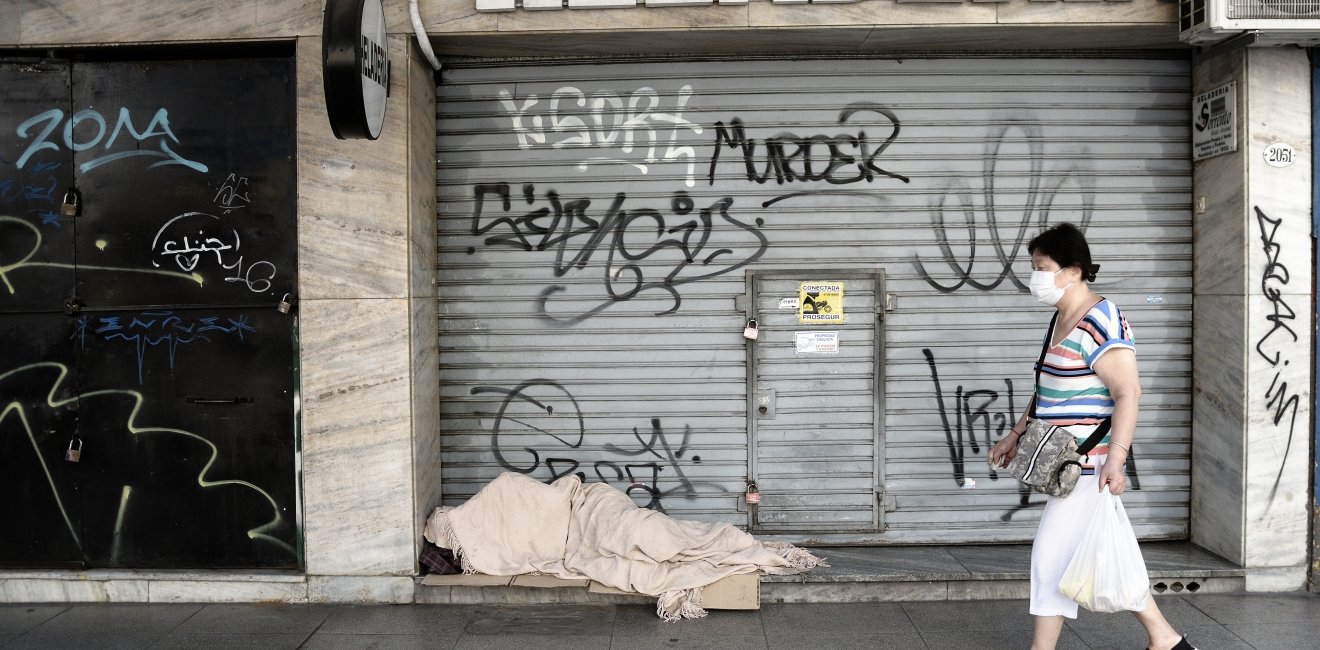
A blog of the Latin America Program
Argentina and Colombia, a Tale of Two Lockdowns
COVID-19 hit Latin America harshly, with the region accounting for over half of global deaths from the coronavirus. In response, governments adopted a diverse set of strategies, including denial in Brazil, Mexico and Nicaragua. By contrast, Argentina and Colombia took early and decisive action by imposing strict national quarantines. Although initially effective, the economically painful lockdowns ultimately failed to stem a recent surge in virus cases and deaths. Colombia now has the world’s fifth-highest number of cases, and Argentina, the ninth. As a result, policymakers in both countries face a difficult balancing act, attempting to bring about economic recovery, and prevent social and political unrest, while keeping the virus at bay.
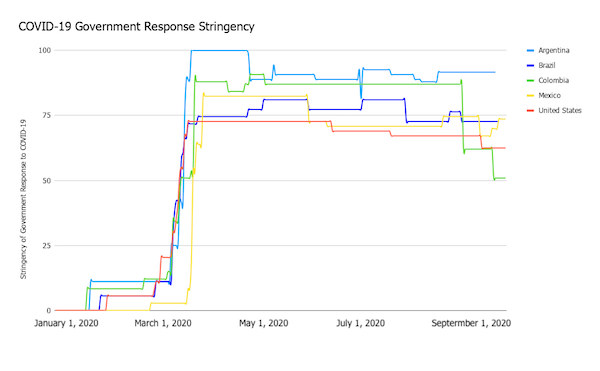
Testing State Capacity
Lockdowns are a blunt instrument, and only part of the toolkit for controlling an epidemic. The World Health Organization has emphasized the importance of extensive testing and contact-tracing for controlling the spread of the coronavirus. However, testing and tracing are complex and costly, and depend on state capacity that is hard to build on short notice. Chile leads the region in testing, while Colombia and Argentina lag far behind, despite efforts to widen access to testing beyond symptomatic individuals, as Colombian President Iván Duque highlighted in recent remarks to the Pan American Health Organization.
In turn, these low testing rates make contact-tracing a nearly insurmountable challenge. In response, Argentina and Colombia have introduced contact-tracing apps to identify cases and permit self-monitoring.
The Argentine contact-tracing app Cuidar is mandatory for essential workers and visitors to the country. It facilitates self-diagnosis and sends a user’s name, identification number and phone number to the authorities for geographical tracing. Over 10 million people have downloaded the app. Colombia’s contact-tracing app CoronaApp also facilitates geographic monitoring of the virus’s spread, tracing a user’s symptoms and quarantine compliance, and connecting him or her to medical professionals. Over 10 million people have downloaded that app as well.
Despite widespread adoption of these apps in both countries, however, the low level of testing has led both governments to rely heavily on lockdowns, at a high economic, social and political price.
Stay Put
As millions of Argentines and Colombians slipped into poverty, compliance with the strict lockdowns flagged. In Bogotá, Mayor Claudia López introduced rotating sector-specific lockdowns, coupled with “Pico y Cédula,” a program to regulate movement based on national ID numbers. As the country’s economy contracted, compliance in the capital declined, especially among daily wage earners, despite tough penalties for scofflaws that included fines up to $250, more than the minimum wage. Colombian workers and business owners took to the streets to protest a lockdown that was pushing companies into bankruptcy. On September 1, Colombia eased its lockdowns and reopened airports.
In Argentina, public angst is also cresting in response to the lockdown. Argentina’s initially lauded social distancing measures are now among the longest in the world. Its government has also imposed harsh penalties for violators. After lifting some restrictions, including those on outdoor dining, cases surged. On August 17, thousands of Argentines protested the extension of the quarantine, part of a series of anti-government protests that continued in September.
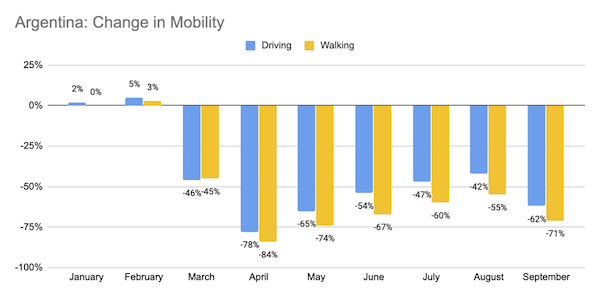
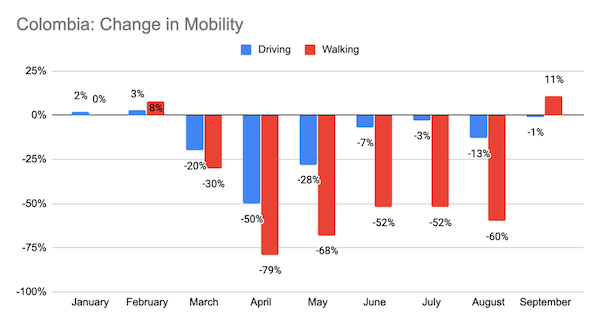
Work-Life Imbalance
In part as a result of lockdowns such as those in Argentina and Colombia, Latin America is expected to see its worst economic contraction since the Great Depression. Argentina’s economy is projected to contract by over 12 percent, while Colombia will endure its worst-ever recession, with output falling by 8.2 percent. These slowdowns have devastated labor markets. Unemployment in Colombia surged to over 20 percent in July. In response, the Colombian government launched a program covering up to 40 percent of the minimum wage for formal workers. That was part of a $31 billion fiscal stimulus program, equal to 11 percent of GDP, to mitigate the economic effects of the pandemic. The government also relaxed restrictions on deficit spending for 2020 and 2021, and the International Monetary Fund approved a $6.2 billion expansion to its Flexible Credit Line to Colombia.
Argentina has also taken steps to bring down its highest unemployment rate since 2006. To prevent mass joblessness, the government prohibited layoffs without cause and created a program to subsidize 50 percent of private sector wages for severely impacted businesses. These and other emergency social welfare programs have pushed the national budget back into a deep hole, with a projected fiscal deficit of 4.5 percent.
A Falling Tide
Despite the massive stimulus spending in Argentina and Colombia, the pandemic’s economic consequences are severe. Upwards of 3.3 million Colombians will fall into poverty this year. Many are informal workers not registered in government assistance programs. To address communities left out of previous programs, Mr. Duque created the “Ingreso Solidario,” which grants $125 to poverty-stricken families not enrolled in other emergency social programs. Nevertheless, a recent survey suggests 63 percent of Colombia’s poor have not received any government assistance. Some have resorted to hanging “trapos rojos,” or red rags, in front of their homes in a plea for help.
A particular challenge for Mr. Duque is Colombia’s population of 1.7 million Venezuelan migrants. An estimated 65 percent of these individuals earn less than the minimum wage, and 30 percent experience food insecurity. The pandemic exacerbated these challenges, prompting the government and civil society organizations to step in to provide food and medical services.
In Argentina, which experienced two years of recession before the pandemic, the poverty rate is expected to jump to over 50 percent this year. The government implemented emergency cash transfer and food allowance programs, though the high rate of inflation is eroding the purchasing power of government payments.
Political Fallout
Although public officials in both countries emphasize the need for continued vigilance, public opinion shows a growing sense of frustration. COVID-19-related concerns are being overtaken by concerns over economic issues.
Initially, Colombians’ top concern was COVID-19, but job security is now a higher public priority. Mr. Duque’s approval rating is up, from 23 percent prior to the pandemic to 38 percent in September, but well below the support he enjoyed earlier in this crisis.
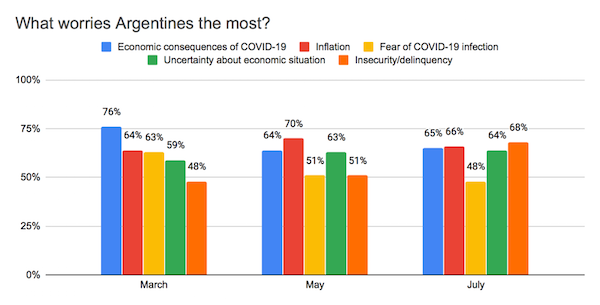
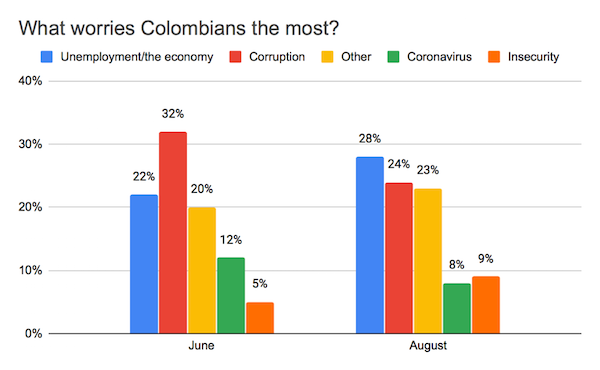
Argentines are also growing more worried about their personal finances. A recent survey revealed that 64 percent of Argentines are fearful about their long-term job security. President Alberto Fernández’s rapid lockdowns earned him an approval rating of 84 percent in April, but his popularity is down to 42 percent.
Rising frustration with public health restrictions, worsening economic strain and expanding virus caseloads have put the leaders of Argentina and Colombia in a vise. A premature economic reopening could erase the benefits of the economically and politically costly lockdowns in both countries. But the political and economic costs of continued restrictions are increasingly hard to absorb.
Authors


Latin America Program
The Wilson Center’s prestigious Latin America Program provides non-partisan expertise to a broad community of decision makers in the United States and Latin America on critical policy issues facing the Hemisphere. The Program provides insightful and actionable research for policymakers, private sector leaders, journalists, and public intellectuals in the United States and Latin America. To bridge the gap between scholarship and policy action, it fosters new inquiry, sponsors high-level public and private meetings among multiple stakeholders, and explores policy options to improve outcomes for citizens throughout the Americas. Drawing on the Wilson Center’s strength as the nation’s key non-partisan policy forum, the Program serves as a trusted source of analysis and a vital point of contact between the worlds of scholarship and action. Read more


Argentina Project
The Argentina Project is the premier institution for policy-relevant research on politics and economics in Argentina. Read more

Explore More in Weekly Asado
Browse Weekly Asado
Dengue Haunts South America’s Summers

Lessons from Costa Rica’s Economic Transformation

Women and Latin America’s Digital Revolution

